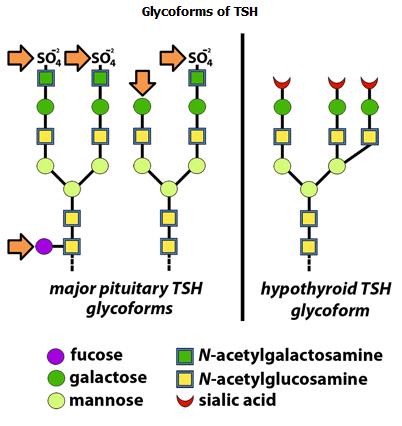On the day that Dr Toft tells the Scottish Parliament that TSH maybe isn't 100% perfect, a paper which expressly investigates one reason that may be the case.
Although we think of TSH as being a single substance - that isn't quite true. It comes in slightly different variations - called isoforms. They have different extra bits attached - that is, they have differing glycosylation. It is a bit like a bakery turning out bread, croissants and iced buns - simply by adding butter or sugar to a basic flour, yeast and water. Although similar, we are all aware of their differences.
If the measurement of TSH in a test and its biological activity are always exactly the same, then there would be no problem. But from what I can see, that seems not always to be the case.
As so very often, nothing much available except the abstract...
Thyroid. 2013 Sep 27. [Epub ahead of print]
THYROTROPIN ISOFORMS - IMPLICATIONS FOR TSH ANALYSIS AND CLINICAL PRACTICE.
Estrada JM, Buckey TM, Burman KD, Soldin OP.
Source
Georgetown University Medical Center, Department of Oncology, Washington, District of Columbia, United States ; je535@georgetown.edu.
Abstract
Serum thyrotropin (thyroid stimulating hormone, TSH) is often the test of choice for the screening, diagnosis and monitoring of primary hypothyroidism. In the general population, serum TSH is considered the single most sensitive and specific measure of thyroid function owing to its negative logarithmic association with free triiodothyronine (FT3) and free thyroxine (FT4) concentrations. Serum TSH concentrations can be analyzed quantitatively using third generation immunoassays, whereas TSH bioactivity can be assessed using assays that measure TSH activity in cell culture. Theoretically, if serum TSH concentrations are directly related to TSH activity, the two tests should yield comparable results. However, on occasion, the results are discordant; serum concentrations being higher in comparison to the biological activity of that TSH. This review focuses on the dissociation between the clinical state and serum TSH concentrations and addresses clinically important aspects of TSH analysis.
PMID: 24073798 [PubMed - as supplied by publisher]
ncbi.nlm.nih.gov/pubmed/240...
Rod

